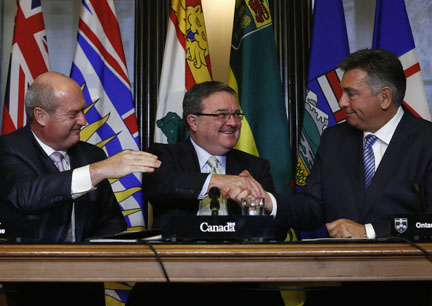The federal government, Ontario, and British Columbia will set up a common securities regulator to try to replace the current patchwork of provincial regulation. However, most provinces, notably Quebec, have not signed on.

Federal Finance Minister Jim Flaherty and his counterparts from Ontario, home to the country’s predominant capital market, and British Columbia unveiled details of their plan on Thursday.
Ottawa has tried for decades to persuade the country’s 10 provinces and three territories to create a national regulator similar to the U.S. Securities and Exchange Commission. Flaherty, himself, has lobbied hard for it since he became finance minister in 2006 with the election of the Conservative government.
Flaherty said the agreement “represents the best of what can be achieved when a shared responsibility becomes a mutual goal”.
He expects other provinces to come on board quickly and said he aims to make the new agency operational by July 2015.
“We expect that Canada as a result of this agreement will attract more investment, our investors will have greater protection, we’ll have more effective prosecution of white collar crime, systemic risk will be better managed,” he told a news conference.
Many provinces, particularly Quebec, have seen the federal government’s efforts to create a national regulator as an intrusion on their powers. The Supreme Court
ruled in December 2011 that it was unconstitutional for Ottawa to impose a common regulator on the provinces and territories.
As a result of that ruling, Flaherty has switched from a unilateral approach to a co-operative arrangement with willing provinces, which would involve enacting legislation at both levels of government and allowing provincial experts to have a greater role.
The regulator would be based in Toronto, but with offices across the country and initially run jointly by Ontario and B.C.

 Federal Finance Minister Jim Flaherty and his counterparts from Ontario, home to the country’s predominant capital market, and British Columbia unveiled details of their plan on Thursday.
Federal Finance Minister Jim Flaherty and his counterparts from Ontario, home to the country’s predominant capital market, and British Columbia unveiled details of their plan on Thursday.